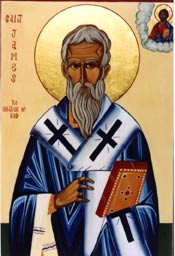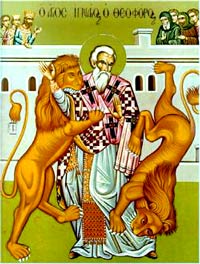Our sending hymn at our services yesterday was
A Mighty Fortress. For some reason, the final verse stuck out to me as especially meaningful.
God's Word forever shall abide,
No thanks to foes who fear it;
For God himself fights by our side
With weapons of the Spirit.
Were they to take our house,
Goods, honor, child or spouse,
Though life be wrenched away,
They cannot win the day.
The Kingdom's ours forever!
Perhaps it was just the moment. After all,
A Mighty Fortress should stir the heart of any Christian, but on Reformation Sunday, Lutherans cannot help but feel some affinity towards this hymn which sets the core of the Christian faith to hymnody. The other possibility working on me there however, could have been that I read the article in the November 2006 issue of
Wired, "
The Church of the Non-Believers. (read the whole article)"
In that article, the author, Gary Wolf, looks at the movement whose adherents are called New Atheists. Atheists since they believe in no god or gods, no supernatural powers at all. But New because they are not content to merely tolerate those who do believe in a supernatural power. They seek converts to atheism. They claim religion is evil, irrational, and not worthy of any respect. Wolf picks out three of the main voices in New Atheism: Richard Dawkins, Sam Harris, Daniel Dennett.
Naturally being an evolutionary biologist Dawkins' main arena of engagement with religious folks is within the creationism/evolution debate. But his argument will probably shock some. He agrees with creationists, and works against moderate and liberal allies. Dawkins argues that evolution must lead to atheism. Dawkins is quoted,
...the big war is not between evolution and creationism, but between naturalism and supernaturalism. ...the "sensible" religious people are really on the side of the fundamentalists, because they believe in supernaturalism. That puts me on the other side.
The question is what is the position of reason? Does reason reign supreme? Wolf moves here to talk about Sam Harris, author of
The End of Faith: Religion, Terror and the Future of Reason. Harris sees an apocalypse brought on by religious faith, which will destroy the world. Harris wants to elevate reason to be the object of religion. Harris says,
We would have realized the rational means to maximize human happiness. We may all agree that we want to have a Sabbath that we take really seriously - a lot more seriously that most religious people take it. But it would be a rational decision, and it would not be just because it's in the Bible. We would be able to invoke the power of poetry and ritual and silent contemplation and all the variables of happiness so that we could exploit them. Call it prayer, but we would have prayer without bullshit.
Where to start at a comment like that? Frankly, if I am going to be converted to atheism, I don't really want religion in another guise. After all religion's root meaning is about being bound. William Cavanaugh, in "God is Not Religious", writes,
The word derives from the Latin religio, a minor term that did not originally mean what we take religion to mean today. Religio referred to a binding obligation (from re + ligare, to rebind); to say that something was "religio to me" meant that it represented a special obligation. (from God Is Not... ed. D. Brent Laytham)
Show me how true happiness is not found in religion at all. Don't give me pseudo-religious babble about the power of poetry, ritual and contemplation, let alone the variables of happiness (what does that mean?). Don't borrow the language of the world's religions to elevate reason to the place of primacy in the world. Give me something new... or else, I will simply dismiss you as a derivative hack seeking to bind me to you.
Notice also what Harris, knowingly or unwittingly, admits about that babble. The power of poetry and all are just commodities that are meant to be exploited. We may dominate and subdue them! Their value exists only in what we can mine out of it. And no matter what he may say about contemplation and ritual, to invoke the word "exploit" is a word full of violent overtones. What shall happen when there are competing narratives even within this religion of reason? And there will be. There will be those who want complete freedom to do whatever they want (as long as it brings no harm to anyone else) and those who think reason shows that a particular ethic must be followed. There will be subjugation and violence meant to compel one branch of reason under another.
The reality of the issue points to the broken nature of reason. Dawkins, Harris, and Dennett all have different visions of what atheism looks like. Were the New Atheists to be succesful, and naturalism were to rise in ascendancy, there would be new wars, the wars of reason. Whose version of reason would win?
One of the threads of this article that gets me is the easily tossed about quip that most intelligent people are atheists. Where does this little piece of conventional wisdom come from? I would want to challenge that presumption. There are many intelligent, faithful Christians. Wolf admits as much as he delves into Christian theology. He disagrees with Dawkins who has claimed that Christian theology is vacuous, and devoid of coherence and content. Rather, he writes, "On the contrary, I find the best to be brilliant, detailed, self assured." However, behind this axiom of the New Atheists also belies a prejudice. When they say "intelligent" they really mean upper class, scientific, descendant of the Enlightenment. All of the atheists mentioned (even in some of the sidebars) are white and male (Hmm... who is
Wired's main audience?).
Finally, Wolf brings up Dennett. It certainly seemed in this article that when Wolf brings up Dennett, the tone switches, from harsher to softer. Dennett is a smart voice. Dennett claims that unexamined, sacred things are useful. They bring about confidence and feelings of security. In a religion of rationality, he could see a policy not to even think about some things. out of pragmatism. They would remain unquestionable for all except the philosopher (the hero of Dennett's religion), who take the risks. Dennett says, "Philosophers should expect to be hooted at and reviled. Socrates drank the hemlock. He knew what he was doing."
At this desription Wolf looks to the biblical image of the prophet, but in the end, Wolf writes what is to me remarkable.
Prophecy, I've come to realize, is a complex meme (note: meme is a theoretical invention of Dawkins, a cultural replicator that spreads like brain to brain, like a virus). When prophets provoke real trouble, bring confusion to society by sowing reverberant doubts, spark an active, opposing consensus everywhere - that is the sign they've hit a nerve. But what happens when they don't hit a nerve? There are plenty of would-be prophets in the world, vainly peddling their provocative claims. Most of them just end up lecturing to undergraduates, or leading little Christian sects, or getting into Wikipedia edit wars, or boring their friends. An unsuccesful prophet is not a martyr, but a sort of clown.
So maybe now... there is no need for urgency. But maybe we need to be forming people now to be the type who can proclaim the gospel, who know that Christianity is not just a religion that binds us to some hierarchical structure, but a way of life that binds us to the God of the universe. We rely on reason only after having had the gospel revealed to us, not secretly as much of reason is revealed to the specialists who can afford the education, but openly and publicly from the pulpit, the altar and the font.
Peace.







